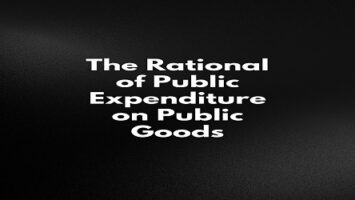Table of Contents
Allocative Functions of Budget Policy:
The objective of the Allocation Branch of the Fiscal Department is to secure the efficient allocation of resources. In other words, the diversion of resources to satisfy public wants is to be secured in an optimal way through budget policy. Hence, the functions of this branch may be viewed as that of making the allocation of resources for the satisfaction of public wants. Let us now examine the various situations in which such allocations are made.
Situations Which Call for Adjustment in Allocation:
Where Market Mechanism Partially Fails:
The price mechanism in the market secures an optimal allocation of resources, provided that certain conditions are met, i.e., purely competitive conditions are present. These conditions are met reasonably well over, wide areas of economic activity, so that the bulk of the allocation function may be left to the forces of the market. In these areas, public policy need not concern itself with matters of allocation. In other words, the price mechanism allocates the resources in an optimal way under purely competitive conditions. Hence, public policy has no role to play in the efficient allocation of resources under these conditions.
Yet conditions arise in many connections, where the forces of the market cannot secure optimal results. Here we are faced with the problem of how public policy can intervene to secure a more efficient allocation of resources. In other words, where market forces cannot secure optimal results, public policy has to play an important role in efficient resource allocation. Let us state the conditions where public policy has to secure adjustments in the allocation of resources.
In the first place, an occasion for adjustment arises where the organization of industry precludes free entry of firms or individual producers as a result of which allocation of resources diverges from that of purely competitive conditions. This is the general case of monopoly control. The existence of market imperfections must be taken into account at the time of determination of efficient budget policy, and the budget policies must be used to remove them.
Secondly, a more difficult problem arises in the case of the lumpiness of productive factors and of productive factors and of production processes that involve decreasing cost. Optimal determination of output requires an equating of average revenue with marginal cost. Under conditions of decreasing cost, the firm cannot be expected to follow such a policy, since it involves a loss. A tax subsidy process is needed and hence, budget policy- is required to secure an optimal output.
Thirdly, there are situations where external economies or dis-economies are generated by the operation of particular individuals or firms. For instance, the establishment of an expensive store may increase the real estate values in the neighborhood, even though the store cannot collect any amount for the services thus rendered, i.e., the store cannot take any advantage for the services it rendered. A railroad into a new territory may lead to gains in economic development that greatly exceeds profits available to that particular railroad. Since the market permits a price to be charged for only a part of the services rendered, hence, development may be unprofitable from the private but profitable from the public point of view.
Similarly, there are situations, where private operations may involve social costs that are not taken into account in private cost calculations and, hence, are not accounted for by the market. For instance, a factory may pollute the air and damage an adjoining resource. The smoke nuisance is a cost to the particular community, yet it is not a private cost to the firm. The resource owners cannot collect the loss from the firm since they cannot prevent the use of the common air. Thus, what is profitable to the private form may be unprofitable from a social point of view.
It is, thus, obvious that satisfaction of all private wants involves gains and losses. Hence, Prof. Musgrave said that there is “a wide array of situations where the market mechanism involves varying degrees of inefficiency in resources allocation.” However, the satisfaction of such wants in most cases is best left to the market. It is here where the public policy (i.e., government policy, should take corrective action to remove such inefficiencies. But in practical life, such action may have only marginal effects. To put it in the words of Prof. Musgrave, “Corrective action may be desirable and feasible, but such action as is taken remains more or less marginal.”
The measure taken to remove the inefficiencies of the market, such as free entry of firms, lumpiness of productive factors and the production process subject to decreasing cost conditions, where external economies or dis-economies (i.e. externalities), are generated are known as corrective measures of budget policy. They are also known as regulatory measures of budget policy.
Where Market Mechanism Fails Altogether:
Since social goods are distinct from private goods, cannot be provided through the market system. In some cases, the market fails entirely, while in others it can function only in an efficient way. Why is it so?
The basic reason for market failure in the provision of social goods is that the need for such goods is felt collectively, whereas that for private goods is felt individually. If I wear a pair of shoes, these particular products will not be available to other individuals. My and their consumption stand in a rival relationship. This is the situation with private goods.
Now consider measures to reduce air pollution. If a given air quality improvement is obtained, the resulting again will be available to all who breathe. In other words, the consumption of such products by various individuals is non-rival. In the sense that one person’s partaking of benefits does not reduce the benefit available to others, i.e., the consumption of one person does not affect the consumption of others. Thus, social goods are non-rival. Social wants are those wants that are satisfied by public services and thus must be consumed in equal amounts. To put it differently, the benefits derived by anyone’s consuming social goods are ‘externalized’ because they become available to all others. This is the situation with social goods. In the case of private goods, the benefits are ‘internalized’ with a particular consumer, whose consumption excludes the consumption by others.
The market mechanism is well suited for the purpose of private goods. It is based on exchange, and exchange can occur only when there is an exclusive title to the property, which is to be exchanged. It means property rights may be sold to others, but generally, others may not use the resource owned by a particular person without the latter’s permission. This permission is usually obtained by paying a price or providing compensation to others. Thus, the market can function only in a situation where the ‘exclusion principle’ applies, i.e., where A’s consumption is made contingent on A’s paying the price, and who does not pay is excluded. The consumers must bid for the product, Thereby, they reveal preferences to the producer, and the producer under the pressure of competition, is guided by such signals to produce what consumers want. This process can function in a market for private goods- for goods such as clothing, housing, automobile, and millions of other marketable private goods.
But, this is not found true in the case of social goods. For one thing, it would be inefficient to exclude any one consumer from partaking in benefits, when such participants would not reduce consumption of anyone else. Since A’s participation in the consumption benefits does not hurt B, the exclusion of A would be inefficient. The application of exclusion would thus be undesirable, even if it were readily feasible. Further, moreover, the application of exclusion is frequently impossible or it is very expensive to prohibit. For instance, gains from air cleaning measures cannot readily be withheld from the particular consumer, street lights shine upon all who pass by, and so forth. Given these conditions, the benefit from social goods is not vested in the property rights of certain individuals, and hence the market cannot function. However, there are instances such as the provision of sewer lines, fees can be charged, and the government can function on a market basis.
But, where the benefits are available to all, consumers will not voluntarily offer payments to the suppliers of social goods. It means consumers will not reveal their preferences to the suppliers of social goods. It means consumers will not reveal their preferences to the suppliers of social goods. Since A’s partaking of the consumption benefits does not reduce the benefits derived by all others, people are not forced to reveal their preferences. To put it differently, since A is not excluded from consumption benefits, when all others make consumption, hence, A is not forced to reveal its preference in bidding for social goods. Hence, no voluntary payment is made. Such, at least, is the case if the number of participants is large. Since the total level of provision will not be affected significantly by any one person, the individual consumer will find it in his or her interest to share as a free rider in the provision made by others. Thus, the linkage between producer and consumer is broken and the Government must step in to provide for such goods. To put it in the words of Prof. Musgrave, People who do not pay for the services cannot be excluded from the benefits that result, (from the provision of social goods); and since they cannot be excluded from the benefits they will not engage in the voluntary payments.” Thus, consumers fail to reveal their preferences for social wants. To put it differently, consumers do not offer the price voluntarily for the benefits they received from social service- since social goods possess two important characteristics- the non-rival nature of consumption, and the inapplicability of exclusion. Hence the market cannot satisfy such wants.
When Consumers are Required to Spend their Income in the Desired Manner:
Public policy may intervene when people are not spending their income in the desired manner. Here, public policy aims at the diversion of those resources that are reflected by consumer sovereignty. Therefore, those wants are satisfied by public services, which could be serviced through the market. But, they are not satisfied by the market, since the consumer chooses to spend their money on other things than those desired by public policy. Here public policy or the budget policy interferes with individual preference on the grounds that people should have more (or less) of some goods than would freely choose at prices equal to opportunity cost. The basis of such intervention may be the presumption that individual lacks the information to act in their own interests or it may be the presumption that consumer’s tastes are inappropriate and should not be responded to. Thus, the reason for budgetary action is to correct individual choices.
Some goods are considered ‘meritorious’ while others are held undesirable. For instance, low-cost housing is subsidized because decent housing is held desirable, while sumptuary taxes are imposed on liquor because drinking is held, undesirable. Goods for which it is thought that consumption should be encouraged are called merit goods; goods having the opposite characteristic may be called non-merit goods.
It should again be stated here that the reason for budgetary action, in this case, is not to be found in the technical difficulties that arise certain services are consumed in equal amounts by all. Separate amounts of individual consumption are possible and the services may be subject to the exclusion principle. It means that such wants can be satisfied by the market. The reason, then, for budgetary action is to correct individual choices.
Public Provision for Social Goods:
To put it in the words of Musgrave, “Since the market mechanism fails to reveal consumer preference in social wants, it may be asked what mechanism there is by which the government can determine the extent to which resources should be released for the satisfaction of such wants; the extent to which particular social wants should be satisfied; and the way in which the cost should be spread among the group. In a democratic society, the decision to satisfy one or another social want cannot be imposed in a dictatorial form. It must be derived, somehow, from the effective preferences of the individual member of the group.” A political process must be substituted for the market mechanism, and individuals must be made to adhere to the group decision.
Thus, the political process enters the picture as a substitute for the market mechanism. “Voting by ballot must be resorted to in place of dollar voting. Thus, decision-making by voting becomes a substitute for preference revelation through the market. The results may not please everyone, but they will approximate an efficient solution. They will do so more or less perfectly, depending on the efficiency of the voting process and the homogeneity of the community’s preferences in this matter.
It is, thus, obvious that political process may be used-
- To obtain revelation of preferences, i.e., to tell the government what social goods should be provided.
- To furnish it with the fiscal resources needed to pay for them.
This is done by voting on tax and expenditure decisions. Individuals, knowing that they must comply with the majority decision, will find it in their best interest to vote for the solution which will move the outcome closer to their own desires, and in this way, they will be induced to reveal their preferences.
National and Local Social Goods:
The benefits from national defense accrue nationwide while those from street lights are the concern only to local residents. Thus, service provided through national defense is a national social good, and that from street light is a local social good. However, national public services be provided by the national government, and local public services by local government.
Public Provision versus Public Production:
Let us now understand the difference between public provision and public production. These two are distinct and indeed unrelated concepts that should not be confused with each other.
Suppose there are two economies, one in which all goods are produced by the government and sold in the market. It means the goods produced by the government are just like private goods. Another, in that all goods are produced privately but purchased by the government and distributed free of direct charge. It means the goods produced by private enterprises are just like public goods. In the former case, there is no provision for public wants, while all production is in public management. In the letter case, there is no public production, but all resources are devoted to the provision of public wants. Thus, provision for public wants, therefore, does not require public production management, just as public production management does not require provision for public wants.
Thus, according to Prof. Musgrave, provision for public goods does not require that they should be produced by government enterprises. Provision of public goods means that the goods and services needed to satisfy public wants must be paid for out of general revenue. The goods and services must be supplied free of direct charge to the user; they need not be produced under direct management or supervision of the government.
Private goods may be produced and sold to private buyers either by private firms or by public enterprises such as the nationalized British coal industry; the petroleum industry in India or the Nationalized Textile Mills in India. Similarly, social goods, such as spaceships or military hardware may be produced by private firms and sold to the government; or they may be produced directly under public management, as are services rendered by civil servants or municipal enterprises. Thus, when it is said that social goods are provided publicly, it means that they are financed through the budget and made available free of direct charge. How they are produced does not matter. To put it in the words of Prof. Musgrave, “The goods and services needed to satisfy public wants must be paid for out of general revenue. The goods and services need not be produced under direct management or the supervision of the government. However, it should have been decided in advance which public want- social or merit, is to be provided through the public budget. Thus, it is not necessary that all the public wants or social wants to be provided through the public budget. However, Prof. Musgrave is of the view that social wants be satisfied through the budget if they are to be satisfied at all.
Balance in Budget:
Besides, Prof. Musgrave also said that for optimal allocation of resources for the satisfaction of public wants, the budget of the Allocation Branch or the allocation budget must be balanced. The amount of resources withdrawn from private use must equal the amount of resources added to public use. It means the benefits derived from the satisfaction of public wants and the opportunity cost of withdrawing resources from the satisfaction of private wants must be equal. To put it in the words of Prof. Musgrave, “The financial balance merely expresses the underlying real balance between the benefits derived from the satisfaction of public wants and the opportunity cost of withdrawing resources from the satisfaction of private wants.” But it doesn’t mean that expenditures are matched by tax receipts. It means the principle of opportunity cost should be applied to the satisfaction of public wants. Such principle may hold good in the case of current consumption expenditure, but it may not hold good even when capital outlays are made. Thus, he said that in the case of capital outlays, the satisfaction of public wants may be accomplished properly through a borrowing purchase mechanism rather than a tax purchase mechanism. Thus, capital outlays may be covered through borrowings. But, the cost of capital outlays including interest charges, may be covered by the beneficiaries through taxes over the lifetime of the capital asset. It should, however, be noted that this principle may come in conflict with the stabilization function of public policy.









Comments (No)